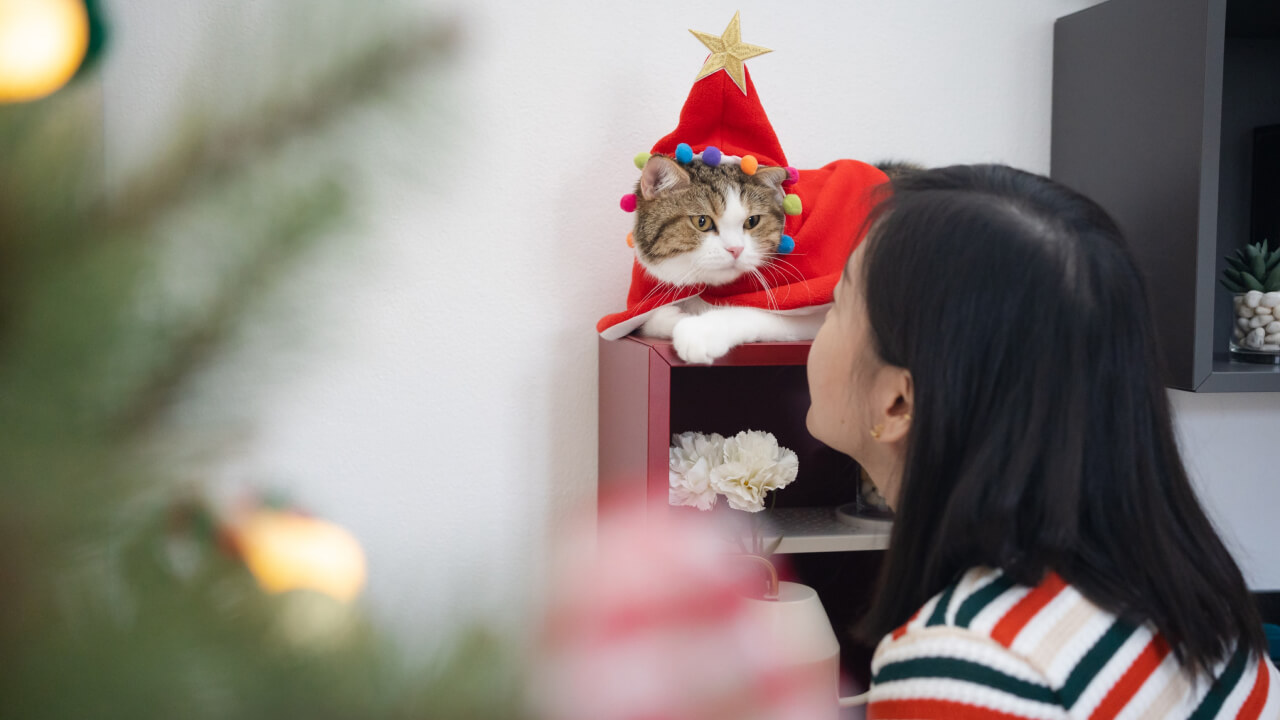The holiday season is a time for joy, celebration, and gathering with loved ones. But amidst the festive cheer, keeping pets safe this holiday season is an important priority for every pet owner. From decorated Christmas trees and common holiday plants to tempting holiday treats, there are countless hazards for our furry friends to navigate.
A curious pet, like your dog, might nibble on breakable ornaments, chew on pine needles, or even ingest salt dough ornaments, risking stomach upset or potentially fatal intoxication. The sweet smell of people food during holiday parties can be irresistible to pets, but sharing scraps could lead to kidney failure or other health issues.
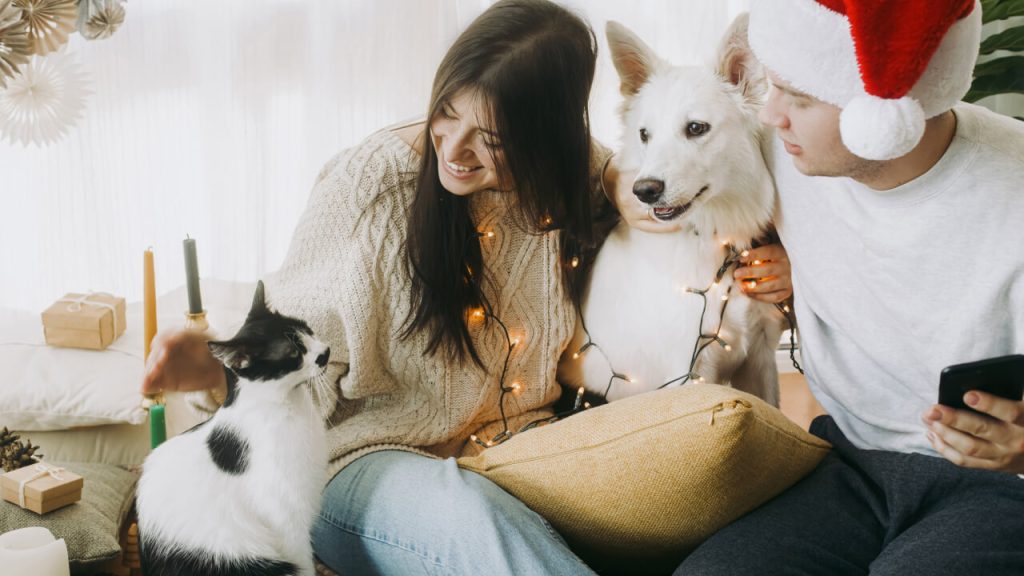
Holiday safety tips : Keeping pets safe this holiday season l Image from Freepik
The holiday season is a time for joy, celebration, and gathering with loved ones. But amidst the festive cheer, keeping pets safe this holiday season is an important priority for every pet owner. From decorated Christmas trees and common holiday plants to tempting holiday treats, there are countless hazards for our furry friends to navigate.
A curious pet, like your dog, might nibble on breakable ornaments, chew on pine needles, or even ingest salt dough ornaments, risking stomach upset or potentially fatal intoxication. The sweet smell of people food during holiday parties can be irresistible to pets, but sharing scraps could lead to kidney failure or other health issues.
Even seemingly harmless decorations like snow globes and holiday plants such as poinsettias or mistletoe can pose serious risks if ingested. Pets may climb on the Christmas tree, knock over breakable ornaments, or get tangled in decorations, making a safe space crucial for their comfort and security.
Holiday travel adds another layer of complexity, requiring advanced preparation to ensure your own pets remain comfortable and safe. By following these holiday safety tips, you can minimize risks and create a festive environment where your furry friends are as happy as the rest of the family.
In this guide, we’ll share essential safety tips to help you and your pets enjoy a joyful and stress-free holiday season.
Understanding Pet Behavior Around Guests
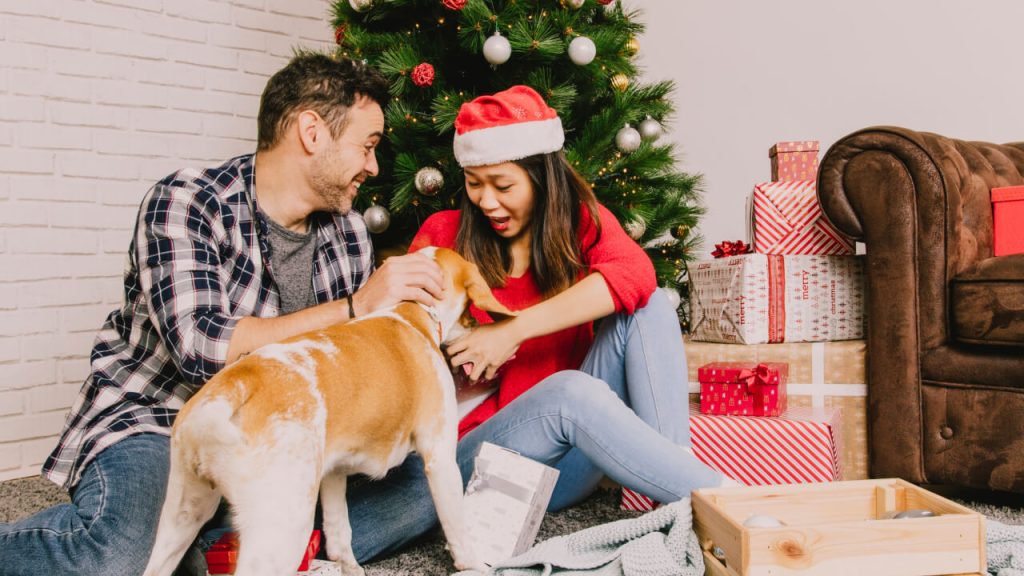
Image from Freepik
Pets thrive on routine, and the hustle and bustle of the holidays can be a significant disruption. Loud parties, the presence of unfamiliar people, and the constant movement of guests can lead to stress for your furry friends.
For dogs and cats, such holiday hazards might result in behaviors like barking, hiding, or even becoming aggressive, especially cats who tend to be more sensitive to changes in their environment.
Understanding their behavior and taking proactive steps can help mitigate potential hazards:
- Stress Signals: Look for signs such as panting, pacing, excessive grooming, or avoiding interaction. These behaviors may indicate your pet is feeling overwhelmed.
- Safe Spaces: Create a designated quiet area away from pets’ potential stressors where they can retreat during holiday gatherings. Include comforting items like their favorite toys, blankets, and perhaps soothing music or essential oils safe for pets.
- Steer Clear of Table Scraps: Keep holiday food, wrapping paper, and other holiday hazards like tree water out of reach. Many foods, such as baked goods containing artificial sweetener or table scraps high in fat, can cause gastrointestinal issues or even require surgery if ingested.
- Monitor Interactions: Excited guests, especially children, may inadvertently turn playtime into a choking hazard or encourage behavior that stresses your pet. Supervise interactions to keep both pets and people safe.
By following tips like these and recognizing the needs of your dogs and cats, you can help them navigate the chaos of the holidays without incident. Respecting their boundaries and ensuring a safe environment will allow everyone to enjoy the season’s festivities more fully.
Holiday Safety Tips for Pets
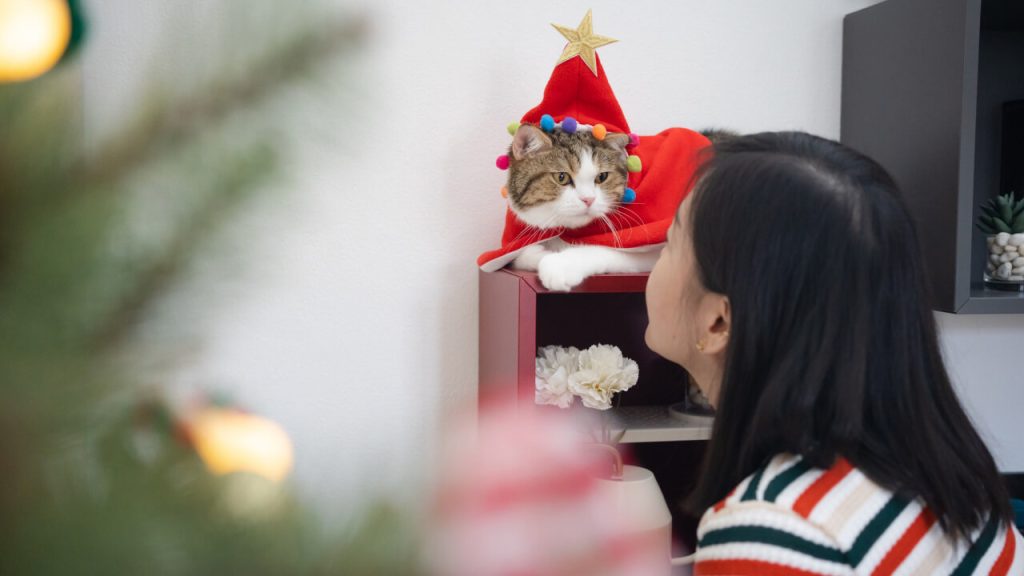
Image from Freepik
The holidays bring unique challenges that pet owners need to navigate carefully, ensuring the safety and well-being of their pets while still enjoying the festivities. From tempting foods to festive decorations, there are several areas to focus on when protecting your furry friends.
Here are some important tips to help keep your pets safe this holiday season:
1. Food Not to Feed Pets
Holiday meals are filled with tempting smells and delicious tastes, but not all human foods are safe for pets. It’s essential to be aware of the foods that can be dangerous to pets during the holidays:
- Toxic Foods: Chocolate, grapes, raisins, onions, and garlic are common holiday foods that can be toxic to pets. Even small amounts can cause serious health issues, including stomach upset, kidney failure, and more severe complications.
- Rich or Fatty Foods: Leftover turkey skin, gravy, or other fatty foods are often given to pets but can cause pancreatitis, a painful condition that may require veterinary intervention.
- Alcohol and Caffeine: Both alcohol and caffeine are harmful to pets. Never let your pets consume beverages containing these substances, and be cautious when entertaining guests who may leave their drinks unattended.
- Sweeteners like Xylitol: Found in sugar-free baked goods, gum, and some candies, xylitol is extremely toxic to dogs, even in small amounts. Ingestion can lead to insulin spikes, liver failure, and potentially fatal consequences.
Instead, treat your pets with vet-approved holiday snacks or a special meal tailored to their dietary needs. There are many safe and delicious options available to make your pets feel included without compromising their health.
2. Holiday Decorations and Pets
Holiday decorations can be irresistible—but also dangerous—for curious pets, especially dogs and cats who tend to be more playful or mischievous during the season. Here are some potential risks:
- Tinsel and Ribbons: Cats, in particular, are attracted to shiny, string-like items such as tinsel and ribbons. If ingested, they can cause intestinal blockages that may require surgery to remove.
- Candles: While candles are often used to set a festive mood, they should be kept out of reach of pets. Pets may accidentally knock them over, resulting in burns or fires. Opt for flameless candles to add ambiance without the risk.
- Electrical Cords: Pets, especially dogs and puppies, love to chew on things. Chewing on electrical cords can result in electrical burns or shocks, so be sure to cover or hide cords as much as possible, using protective coverings to minimize the risk.
- Ornaments: Glass ornaments, pine needles, or delicate ornaments can be dangerous for pets. If broken, they can cut paws or mouths. Avoid hanging fragile ornaments at pet-level and opt for shatterproof decorations. Also, be cautious of ornaments with small parts that can present a choking hazard.
3. Christmas Trees and Pets
The Christmas tree is often the centerpiece of holiday decorations, but it poses unique challenges, especially when pets are involved. Here are some ways to keep your tree and pets safe:
- Stabilize the Tree: Ensure your tree is anchored securely to prevent it from tipping over if your pet decides to climb or bump into it. If you have a curious pet, consider using a sturdy tree stand or tethering the tree to the wall for extra stability.
- Avoid Edible Decorations: Popcorn garlands, candy canes, and other edible tree decorations can entice pets to jump on the tree and snatch a snack. Ingesting these treats can cause digestive issues or even an intestinal blockage. Also, avoid using firestarter logs, as they contain sawdust and paraffin, which can irritate your pet’s stomach and cause blockages.
- Water Hazards: If you have a live tree, the water at the base of the tree often contains preservatives or sap, which can be toxic if ingested. Prevent your pets from drinking the tree water by covering the base with a tree skirt or using a tree water protector.
4. Holiday Travel and Pets
Traveling with pets during the holidays requires thoughtful planning. Whether you’re hitting the road or taking a flight, here are some tips to ensure your pet’s safety:
- Comfortable Carriers: Ensure that your pet has a secure, comfortable, and well-ventilated carrier for travel. This will help reduce anxiety and prevent them from moving around in the vehicle, which can be distracting while driving.
- Health Check: Visit the veterinarian before any long trips to make sure your pet is healthy and fit for travel. A vet check-up can ensure your pet’s vaccinations are up to date and prevent any last-minute health issues.
- Identification: Always make sure your pet is wearing updated ID tags with your contact information and is microchipped, in case they get lost during travel.
- Routine Breaks: For road trips, make sure to plan for bathroom breaks and stretch time for both you and your pet. This will help reduce stress and keep your pet comfortable during long journeys.
If your pet is staying home, make sure to arrange for a trusted pet sitter or boarding facility to care for them while you’re away. Ensure they have a familiar routine and feel secure during your absence.
5. Plan in Advance in Case of Emergency
Emergencies can arise even with the best planning. Being prepared will give you peace of mind in case something goes wrong:
- Know Your Vet’s Holiday Hours: Ensure you have the contact information for your regular veterinarian, as well as a 24/7 emergency veterinary clinic in your area. Keep your pet’s medical records handy in case you need to seek care during off-hours.
- First Aid Kit: Keep a pet-specific first aid kit handy, stocked with essentials such as bandages, tweezers, a thermometer, and a pet-safe antiseptic to handle minor injuries or emergencies.
- Poison Control Hotline: Save the number for a pet poison hotline, such as the ASPCA Animal Poison Control Center, for quick guidance if your pet ingests something toxic.
By preparing in advance and being aware of potential risks, you can ensure your pets stay safe and happy throughout the holiday season.
Conclusion
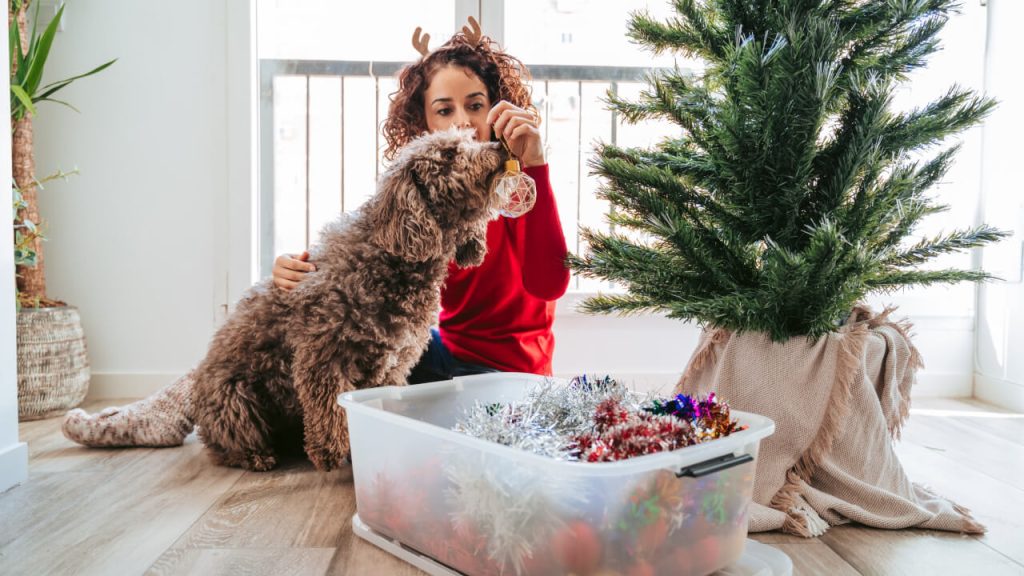
Image from Freepik
The holidays are a time for making cherished memories with family, friends, and, of course, our beloved pets. However, it’s essential to remember that many festive staples, like decorations, candy, and treats, can be dangerous for them.
Items like tinsel, chocolate, and ethylene glycol (found in some snow globes) are toxic, while certain decorations and tree ornaments may contain lead or pose a choking hazard. Don’t forget to monitor trash and other items that might tempt curious pets, including leftover food, wrapping paper, and discarded holiday treats.
Keeping your furry friends safe starts with mindful planning and these helpful tips. Secure your Christmas tree to prevent accidents, and keep harmful items like mistletoe, candles, and medications away from pets. Create a welcoming environment for guests while providing your pets a safe retreat equipped with comforting toys. Pay attention to how visitors interact with your pets and address any signs of stress promptly.
Dogs and other pets bring joy to our homes, but the holiday season can present unexpected risks for dogs and other pets alike. Dogs, being naturally curious, might explore dangerous items like chocolate, tinsel, or trash left unattended during holiday gatherings. With guests and visitors frequently coming and going, it’s important to ensure that your pet’s environment is safe and secure.
A veterinarian’s guidance can be crucial if your pet ingests something harmful. Providing a quiet space for pets to retreat to is essential, especially when guests arrive. Remember, keeping your dog or other pets safe from dangers like trash, chocolate, and tinsel ensures a happier holiday season for everyone—including your furry friends!
If your pet shows signs of ingesting something harmful, contact your veterinarian without delay. Being vigilant about potential hazards ensures that everyone, including your pets, enjoys a joyful and safe holiday season. After all, their wagging tails and purring companionship are what make this season truly special. Let’s make the holidays bright, safe, and memorable for every member of the family!


